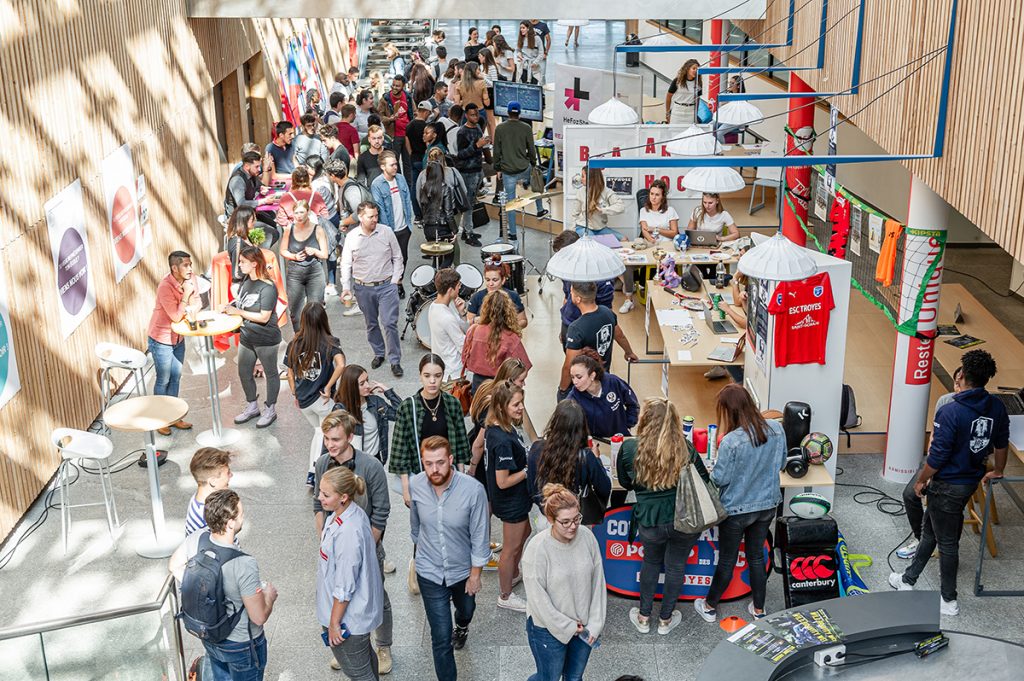Diversity is ‘a strength which opens opportunities’ and that’s why exposure to different backgrounds and ways of thinking is a firm focus for Céline Fauchot, Dean at France’s South Champagne Business School (SCBS), part of the Y SCHOOLS ecosystem
‘In your personal life, or in your professional life, you must be prepared to accept and to cultivate diversity. It is a strength which opens opportunities,’ says Céline Fauchot, Dean at South Champagne Business School (SCBS) in Troyes, France.
Students at SCBS are therefore encouraged to work with those from different backgrounds, Céline Fauchot explains, as well as with those studying at different institutions within the Y SCHOOLS ecosystem to which the School belongs. ‘We do not want to create clones – we cultivate the difference!’ she adds.
Céline Fauchot also talks about the continuing challenge of convincing people that online learning need not be of lesser quality than face-to-face interactions, in this interview with Business Impact Content Editor, Tim Dhoul.
The value of being able to learn and develop for the future through the Y SCHOOLS’ campus in Cameroon is another topic covered by the SCBS Dean. ‘Innovation is a key issue for Africa and we are very excited to be part of the change.’ Read on to learn more.

Please can you tell me a little about the programmes available at your School, as well as typical student intake sizes and proportions of international students?
SCBS offers four programmes among which is: a Programme Grande Ecole (PGE) master’s degree with four different tracks; an MSc in Innovation, Creativity and Entrepreneurship; a BBA with the opportunity to work and/or study in four countries; and the Global Business Management bachelor’s.
What do you think makes your portfolio of programmes stand out from others that are available in the country headquarters of your School and the surrounding region?

Our portfolio of programmes can really be considered different because our Business School model is different.
SCBS belongs to the Y SCHOOLS ecosystem, inside of which different schools (including schools in design and tourism, for example) work together and open possibilities to create unique multidisciplinary programmes. The MSc in Innovation, Creativity and Entrepreneurship and Strategic Design Management programmes on offer are good examples. Thanks to Y SCHOOLS, we can develop and strengthen transversality and diversity in our programmes.
Something else which stands out is the possibility students have to integrate an apprenticeship into their master’s degree.
Does your portfolio of programmes encompass international study or international work experience? If these elements are optional rather than requirements of the programme(s), how many of your students take advantage of these options, on average?
International [experience] is an integral part of SCBS. More than 40 different nationalities compose our student number. Almost all students are keen to encompass the international dimension during their study. For instance, a BBA student can spend up to 30 months on internships in four different countries.
Please outline diversity’s importance to your Business School’s strategy and why you feel it is a vital topic for business as a whole today.
Our ambition has always been to consider diversity as a strong component for our development. Whether it’s diversity of skills, culture or ways of thinking; diversity is real life!
In your personal life, or in your professional life, you must be prepared to accept and to cultivate diversity. It is a strength which opens opportunities. That’s why we make French students work regularly with international students. In addition, the students of our management programs work in close cooperation with those enrolled on design and engineering programmes. Cultivating diversity to cultivate curiosity and open-minded personalities is the Y SCHOOLS concept. We do not want to create clones – we cultivate the difference!
How is the School working to boost the employment prospects of its graduates? (E.g. through the use of internship schemes, exchanges, or other industry initiatives)
A strong focus at SCBS is to ensure that companies are ‘inside’ our Business School and not ‘beside’ it. [There is] no way to imagine our Business School without a strong relationship with the world of Business.
Company and block-release training [a form of vocational education in France, linking study to the world of work] exhibitions are often organised with several specific focuses and ways to catch the attention of both companies and graduates.
Specific attention is also given to soft skills. A unique PPP (Professional and Personal Project) is implemented for each student, for example, to ensure that they get all the tools [they need] to be ready when they enter their professional lives. And six months after graduation, 94% of our graduates have secured a job.
How are programme curricula developed and refined at your School to ensure that they remain in touch with the changing needs of both students and employers?
The world is changing, technologies are changing, needs are changing… so our daily concern is to ensure that we prepare our students for the reality and for the future needs of enterprises.
With this purpose in mind, we have implemented a process to evaluate the efficiency of our pedagogical approach. We also have a Laboratory of Pedagogical Innovation that proposes new teaching tools regularly, so as to fit the changing characteristics of our students.
Through advisory boards that include companies, our pedagogical teams – supported by professionals – ensure that our curricula are in line with what is anticipated to be the needs for tomorrow.
Which single new programme course or initiative are you most excited about and why?
A new, open-minded programme will be launched in January that is designed to support students who still have doubts about their future direction, by integrating management, design and tourism courses. The programme, Stud’Up, recognised by the Ministry of Higher Education, Research and Innovation Ministry (MESRI), is very exciting as it represents a real answer to the situation of many youngsters who have not found their way or who are disappointed by their current choice.

If we come back to our DNA, entrepreneurship programmes are the most exciting. Being close to the Technopole de l’Aube and having a foot in the local incubator, as well as links to the Design School in the Y SCHOOLS ecosystem enables SCBS to offer different opportunities to our students.
What are your hopes for the School in the next five years – what do you want to see happen?
SCBS has always been recognised in France for its focus on entrepreneurship and innovation. We expect to strengthen these expertises and create new programmes that will be in line with global changes in behaviours, technologies and, above all, ensure that we are meeting the needs of business world.
Through the Y SCHOOLS campus in Yaoundé, Cameroon, we also expect that our engagement on the African continent will enable us to develop new skills in entrepreneurship and innovation. Innovation is a key issue for Africa and we are very excited to be part of the change in some of the region’s countries.
What are some of the biggest challenges facing providers of business education in the country headquarters of your School and the surrounding region, in your opinion?
One ongoing and challenging change in the French education system is the development of online learning. French students and families remain quite reluctant to this evolution and one of our challenges will be to accompany them on the journey towards accepting this evolution of technology by ensuring that the quality of learning will not only be the same as in face-to-face courses but, for some content, it will be upgraded. New technologies will really open new doors.
Céline Fauchot is Dean of SCBS (South Champagne Business School) – part of the Y SCHOOLS ecosystem – in Troyes, France. A French Business School graduate, she has more than 25 years of industry experience and has created and managed marketing teams at international level in the automotive, mechanical and medical industries.




























